Problem-Based Learning in the Brazilian Congress of Engineering Education since 2010 up to 2019: A Systematic Literature Review ()
1. Introduction
Engineering education in Brazil, since 1973, has a space for discussion, which is the Brazilian Congress of Engineering Education—COBENGE. Event organized by the Brazilian Association of Education in Engineering—ABENGE.
ABENGE (2020) on its website informs that it was founded in October 1973 by representatives of engineering education institutions in Brazil and that has among its objectives:
I) Promote exchanges of information on activities and problems of common interest, on ideas or plans that may result in general improvement in administration, teaching, research, and extension; ... IV) Promote cooperation in planning the development of engineering education, coordinating information, collecting data on the labor market and the immediate and future needs of the country; ... VII) Promote the improvement of the engineering student’s conditions, aiming at their full professional, critical, and reflective training; ... VIII. Promote exchanges with national and international entities and specialists in the search for an effective exchange of experiences and knowledge; ...
To achieve these objectives, ABENGE develops several activities. Many of these activities have existed for many years and others have been created over the years, to carry out the mission they are proposing.
ABENGE (2020)’s mission presented on the website is:
Produce necessary changes to improve the quality of undergraduate and graduate education in engineering and technology in Brazil, contributing decisively to the formation of increasingly qualified and trained professionals who take development and technology to all parts of the country for the benefits that engineering can provide the entire population.
As COBENGE is an event that produces a lot of knowledge about various topics related to engineering education both in undergraduate and graduate courses.
We have in it a great theoretical framework that allows teachers of undergraduate and graduate courses in engineering to seek information and knowledge to develop their disciplines.
Ribeiro (2007: p. 15) indicates that according to Vasilca (1994), Ning (1995) and Moraes (1999) the knowledge, skills, and attitudes necessary for the professional action of engineers are:
Knowledge: knowledge of the fundamentals of engineering (science and technology) and the relationships between its various branches, as well as knowledge in areas such as computing, business administration, profits, finance, customer satisfaction, competition, risks, taxation, laws and regulations, marketing and impact on the environment and people. Skills: development of projects in laboratories or in the field, problem analysis, synthesis of solutions related to the practice in use, communication, teamwork, resource and process management, self-evaluation, and peer evaluation. Attitudes: ethics, integrality and responsibility towards colleagues, society and profession, concern for the environment, initiative, entrepreneurship, adaptability, willingness to seek out specialists (experts) when necessary, motivation and interest in autonomous and continuous learning throughout their lives.
Therefore, all who work in the training of future engineers need knowledge and information to assist in their performance in higher education.
Due to the growing volume of information produced in recent years it is important that researchers can develop, and access knowledge produced by peers and that it can be facilitated by Systematic Review (SR).
This article has as a research method the Systematic Literature Review (SLR) that allows researchers to organize not only the state of the art but also the tendency to study a certain knowledge (LEITÃO et al., 2010: p. 5), enabling specific interventions.
RSL was created by Archie Cochrane and collaborators in 1972, it consists, among other points, in the consultation of original literature and critical analysis of the literature.
Based on the use of SLR, we can analyze a large volume of information, making it possible to identify gaps in the research presented, without converging to that or that point, as it presents explicit selection criteria, which allows its replication and evaluation by other researchers.
The objective of this paper is to point out “What were the articles that discussed the active methodology Problem-Based Learning in the period 2010-2019 at the Brazilian Congress of Engineering Education—COBENGE”.
In this way, pointing out to teachers of engineering courses how they can use the active Project Based Learning methodology in their subjects in the training of new engineers with actions focused on the needs and activities developed by them in the world of work.
Bearing in mind that the active Problem-Based Learning (PBL) methodology is characterized by using everyday professional problems to develop critical thinking, problem solving skills, among others.
2. Methods
The present study searched for articles presented at the Brazilian Congress of Engineering Education—COBENGE, organized by the Brazilian Association of Education in Engineering—ABENGE, in the period from 2010 to 2019. We emphasize that in the years 2013 and 2015 the data were not accounted for due to indication by the ABENGE website that they are being made available.
On the ABENGE website, articles from various areas are made available for this research. Articles were selected to discuss various aspects. During the editions of COBENGE from its beginning until 2014 the articles were not divided by specific areas, as of 2016 thematic areas were created such as: Cross-cutting themes in engineering education; Methodologies for teaching engineering; Evaluation and performance of engineering courses; Retention and dropout in engineering courses; Engineering teacher training; Technological innovation in engineering education; New challenges for engineering education; Integration of teaching, research and extension in engineering courses; The internationalization of the training of Brazilian engineers.
The articles selected for this SLR must relate to the active Problem-Based Learning—PBL methodology. With the definition of the thematic areas, Methodologies for Engineering Teaching also became one of the criteria for selecting articles.
But not all articles dealing with PBL are part of this SLR, as they were excluded due to established criteria such as: disciplines related to Basic Education in Elementary and Secondary Education, also disciplines related to postgraduate and Distance Education—DE.
The search for the data took place on the website of the Brazilian Engineering Education Association—http://www.abenge.org.br/publicacoes.php.
Each year of the event was accessed, the files were opened and all abstracts were read to verify that the criteria established for inclusion were present in this way, the articles containing these criteria were selected and copied into a specific folder.
After selecting and reading the papers, the title, abstract, keywords and name of the author(s) were informed in the Microsoft® Excel® program, we generated several spreadsheets for each year selected for the 2010 to 2019 analysis.
3. Results
Graphic 1 presents the results achieved with SLR show that the PBL begins to present a significant number of articles proposed from the year 2010 where within a universe of 322 (three hundred and twenty-two) articles, 70 (seventy) were selected that cover themes related to active methodologies, teaching methodology, teaching and learning in engineering and only 7 (seven) papers covers Problem-Based Learning—PBL active methodology.
As we can see in the writings of Miranda, Bock, Amann, Rossetti, Sá and Grazzini (2010) “one of the biggest problems in engineering education is the lack of initiative and passivity of most students”, which, according to the authors, is due to lack of immediate applicability of the learnt content.
This is one of the great debates for engineering education in the world and in Brazil. In the search for training that makes it possible to build professional training that strengthens the relationship between the knowledge in engineering world and the work of engineering world.
For Balthazar, Silva, Monteiro and Rodrigues (2010) “this proposal signals a curriculum that favors the process of “learning” from the student over that of “teaching” from the teacher,” seeking to abandon a simplistic attitude in the teaching process.
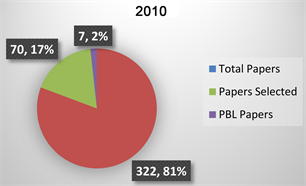
Graphic 1. PBL papers approved for congress in 2010.
Graphic 2 in 2011, the production of articles for the COBENGE event reached 476 (four hundred and seventy-six) articles, selected 44 (forty-four) papers and 12 (twelve) articles fit the selection criteria for articles that presented proposals effective with the Problem-Based Learning—PBL active methodology.
The articles presented proposals targeted to general training subjects as well as specific training in engineering education.
An example is the article presented by Silva and Cabral (2011) “... it consists of the detection of lightning strikes. The work shows the areas that a graduate student in Electrical Engineering needs to know to solve ...”.
Oliveira, Castro, Monteiro, Oliveira and Cavalcanti (2011) “... presents results of teaching experience in the discipline of Humanities and Citizenship for students at Campus do Gama at the University of Brasília, UNB”.
Passing through the most diverse disciplines and courses such as Control and Industrial Automation, Mobile Robotics, etc.
These possibilities can lead engineering course coordinators as well as professors from different disciplines to organize interdisciplinary projects that may involve several disciplines for the integral training of students in engineering courses.
Graphic 3 presents the paper in 2012, it is possible to observe the use of the Problem-Based Learning active methodology to develop extension projects with the community where Higher Education Institutions—HEIs are inserted.
An article presented by Cusmova, Aguila, Franzoni and Sabión (2012) records this by proposing a program to improve the learning of physics for students in the first and second semesters of the engineering course.
Silva et al. (2012) in their article related to graduation in Environmental Engineering when questioning the satisfaction of academics in relation to the active methodology Problem-Based Learning is around 93% (ninety-three percent).
The data for 2013 and 2015 could not be collected due to the indication on the ABENGE website that the reports are under development.
Graphic 4 shows that in COBENGE mark is double of articles that were presented related to the Problem-Based Learning active methodology, 25 (twenty-five).
Tenório, Faria and Silva (2014) present an article with a proposal on Problem-Based Learning and comment on other modalities of active methodologies.
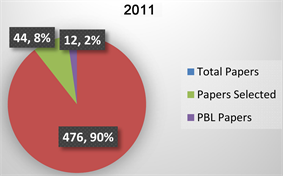
Graphic 2. PBL papers approved for congress in 2011.
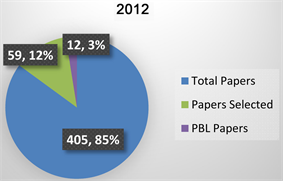
Graphic 3. PBL papers approved for congress in 2012.
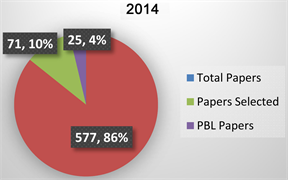
Graphic 4. PBL papers approved for congress in 2014.
Boer and Caten (2014) shown in their article how to work on Problem-Based Learning using didactic kits, in order to motivate the participation of teachers from other disciplines from the training of engineers to apply the concepts and knowledge of PBL in higher education.
In Graphic 5, in the year 2016, COBENGE goes thru changes and specific areas are created to register articles. Articles related to the active methodology Problem-Based Learning becomes part of the thematic area “Teaching Methodologies for engineering”. This area has the register of 172 articles. Were selected, due to the inclusion criteria, 51 (fifty-one) articles. And from these, 15 (fifteen) articles cover the Problem-Based Learning active methodology.
Where Silva and Toffoli (2016) present in their article the indication that “... new methodologies and techniques in engineering education are crucial to obtain engaged, motivated and enthusiastic students” indicating that new methodologies take academics out of their comfort zones and including them as responsible for their learning brings, in its conclusion, the indication of the development of new competences and skills.
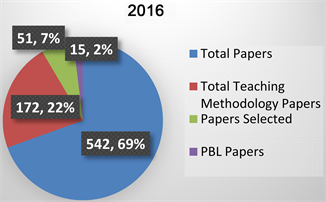
Graphic 5. PBL papers approved for congress in 2016.
Ferlin (2016), on the other hand, writes in his article that “... PBL has shown itself to be an effective mechanism in the teaching-learning process [...], in the case of engineering it ends up having a crucial role in learning and application knowledge”, complements his presentation with the indication that student engagement and motivation involve the search for knowledge from various disciplines as well as developing the issue of group work.
Another article presented by Araújo, Santos, Barros, Melo and Oliveira Netto (2016) indicates that “... the work with PBL allowing, [...], that students realize the importance of planning and controlling production processes, [...] to associate them with the ten major areas of Production Engineering, expanding their [..] professional performance”.
Graphic 6 draws attention to the large number of works related to the subject of “Teaching Methodology for Engineering”.
Tenório, Silva, Gonçalves and Oliviera (2017) in their article present work with robotics as a way of developing STEAM skills.
Crisóstomo, Silva e Silva, and Lima (2017) indicate that in Naval Engineering “in the last decades, there has been a series of technological advances inserted both in the world and national market”. They present in the final considerations of their article that “… the project aims to encourage students to seek more and more knowledge to overcome the barriers of theory and develop new tools and skills that will be useful for the job market.”
Graphic 7 shows the number of papers on PBL approved at COBENGE 2018 where Stark and Pinto (2018) present the idea that the “use of PBL must be understood as an educational perspective, not only as a method. Provides the curriculum guidance (content) ...”, presents the concept of andragogy designed for adult education. They also indicated that “the interventions had a satisfactory performance in relation to the contents worked on, as the vast majority of high-quality products were generated”.
For Sousa, Noll and Cidade (2018) wrote that “... this type of project has managed to increase fundamental mechatronic concepts in the most diverse areas ...”, when presenting their article.
For Lemos, Rey, Salim, and Pereira (2018), working with PBL enabled academics to think about their projects to interact with real companies and involving everyone with the routine of these companies.
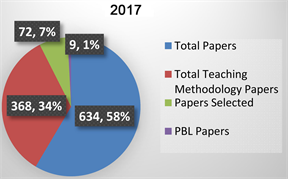
Graphic 6. PBL papers approved for congress in 2017.
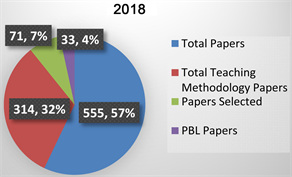
Graphic 7. PBL papers approved for congress in 2018.
The articles showed describe how they were applied and how they were conducted by the teachers responsible for the disciplines that make up the training of engineers in the most different areas of expertise.
Graphic 8 shows the number of papers on PBL registered in COBENGE 2019 were Kempka, Kuritza, Chulek, De Souza and Souza (2019) indicate in their article that the review of teachers’ teaching practices in relation to their teaching plans, conclude that “... classes that take the methodological perspective and get involved actively in the tasks obtains good results in relation to the expected objectives.”
Santos, Lopes, Antunes Jr. and Santos (2019) present a review article that focuses on 28 works of active methodologies in engineering education presented during the years 2014 to 2018 at the Brazilian Congress of Engineering Education—COBENGE, reaching the conclusion that PBL is the active methodology that had more articles presented in the analyzed period.
Rodrigues (2019) indicates that “... in relation to the new National Curriculum Guidelines for engineering courses, they have indicated the use of active methodologies in the development of competencies and skills of engineers for industry 4.0”.
Santos and Guedes (2019) present in their article a qualitative analysis on the use of the active PBL methodology in two disciplines analyzing four dimensions: teamwork, learning, multidisciplinary aspect, and leadership. 13 statements were made, and the students gave grades from 1 to 7, showing that the PBL favored multidisciplinary skills, facing challenges in a creative way, strengthening teamwork.
As Graphic 9 presents in these ten years of analysis of the articles presented at the Brazilian Congress of Engineering As Education—COBENGE, 4172 (four
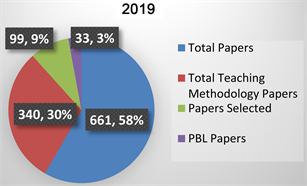
Graphic 8. PBL papers approved for congress in 2019.

Graphic 9. PBL papers approved for congress from 2010 to 2019.
thousand one hundred and seventy two) articles were published in the annals of the event; of these, 537 (five hundred and thirty-seven) articles were selected according to the criteria established for inclusion of articles and only 146 (one hundred and forty-six) articles that covers the active Problem-Based Learning methodology were selected and read for this Systematic Literature Review.
4. Conclusion
The National Curriculum Guidelines for the Undergraduate Engineering Course launched on April 24th, 2019, brings in chapter three of the organization of the engineering course at article sixth, item eighth, at sixth paragraph it reads “The use of methodologies for active learning, a way to promote more student-centered education” (Brasil, 2019).
In this way, it can be observed that the articles presented during the years 2010 to 2019 at COBENGE show an evolution in the discussions about engineering education.
The number of articles rose year by year and shown experiences developed in the most different disciplines and in all years of engineering courses, both for incoming students and students in late periods of the course.
Many articles also addressed the development of disciplines called integrating disciplines that mostly involved the knowledge of other disciplines to develop projects over the years.
Also, in 2019, COBENGE hosted a Special Session on the Brazil-United States Program to modernize higher education in undergraduate courses.
The vast majority of PBL articles used projects related to the most different disciplines to develop different skills that are presented at article four from chapter two of the National Curricular Guideline of the Engineering Course.
All these articles can show researchers in the field of engineering education, specific training, disciplines, and years of training that can be used to research and develop experiments.
Acknowledgements
We are grateful to the Federal Technological University of Paraná—UTFPR/ Campus Ponta Grossa and to the board of the Research and Graduate Studies from the Doctoral Course of the Graduate Program in Science and Technology teaching, for helping in the dissemination of this article. The acknowledgment also extends to the Department of Education and Sport of the State of Paraná and the General Superintendence of Science, Technology and Higher Education.